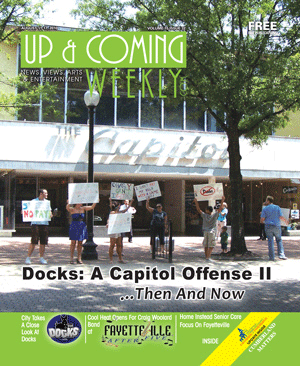 The Fayetteville City Council meeting this past Monday night was indeed not its
finest hour. Rather, it was an indicator of how far our elected city government has
not come. The council voted on a controversial issue along strict racial lines, supporting
an appeal by a black entrepreneur for a city-backed loan to build an entertainment center
in the former Capitol Department Store building, to be called Docks.
The Fayetteville City Council meeting this past Monday night was indeed not its
finest hour. Rather, it was an indicator of how far our elected city government has
not come. The council voted on a controversial issue along strict racial lines, supporting
an appeal by a black entrepreneur for a city-backed loan to build an entertainment center
in the former Capitol Department Store building, to be called Docks.
Whether the planned use for the to-be-recycled building has sufficient merit to justify the city-backed loan is one issue; how the approval was reached is another. It would appear that each councilperson’s vote was consistent with the views of the voters in their respective districts, as they perceived them. If that was the case, then so be it, but it does not deny the fact that the vote was along racial lines. Mel Henderson who is developing the project is black, as are the five council persons who voted on the project.
Councilman Johnny Dawkins is quoted as saying the vote was not on racial lines. Sorry Johnny, if it looks like a duck, quacks like a duck it, you guessed it, it is a duck. Lois Kirby, a white council member, did not vote because she was out of town. The city manager’s office was alerted to her absence well ahead of the time this past Monday’s agenda was set and therefore — hmm.
So the vote on this matter was both a victory and defeat for our mayor who would have this diverse community be racially unifi ed — if that is possible.
For Dr. Henderson, the vote was a solid victory after years of struggle to obtain public financial support for his private enterprise. Independent business people are intrinsically risk takers, but as Dr. Henderson is quoted as saying, “This is speculative and you’re either a fool to do this project or you have to have incentives.”
Or maybe, Dr. Henderson, both.

But who is fooling who? Let us trot out our trusty calculators and legal pads and run the numbers, as they have been provided to us by local media. First we all want publicly backed projects to have some “greater good” spin. In this opportunity, jobs seem to be in the forefront, 110 of them. So, if this number is representing full-time equivalent employees, as it should, and if they all earn something near minimum wage, the payroll, including appropriate taxes, should be about $2,000,000. This will be a nice shot in the arm to the local economy. Let us vote for it.
But wait, isn’t the enterprise to deliver about $75,000 in sales taxes to the city? On a two percent sales tax return rate basis, that means Dock’s should realize gross revenues of about $3,750,000 annually. But payroll alone is going to be $2,000,000 — more than half of gross revenues. This does look risky. Better vote against it.
Well, what about property taxes of $110,000? That’s good isn’t it? Yes, but we have to forgive half of that for five years. Gee, not so good, maybe vote against it. Well, what about 178,000 people annually coming downtown to patronize this facility? Won’t that be good? Sure, assuming the business is open 360 days a year, to about 500 people per day. On a nine hours-per-business-day basis, that works out to one person a minute every day, day in and day out, throughout the year.But wait, to gross $3,750,000 per year, each of these 178,000 only have to spend $20 per visit. That is an awful lot of video games per person every minute.
In all seriousness, a business that would attract that much traffic would be up and running somewhere in this community and it would not have required nine years of wrangling to get it off the ground. So the offered numbers are suspect and the taxpayer’s money is very much at risk.
Perhaps the coldest wind this council decision blows is toward those community members that are currently ensconced in the downtown area, and particularly those in the historic district. They took risks with their own money (and do not get a 50 percent property tax relief consideration) and have not had an easy time getting their respective businesses to a successful point. Now comes Docks, which, if it works, will exacerbate an already serious parking problem.
How does the city address this? Something akin to, “Tough bananas you Downtown Alliance members. Your parking, precious little as it is, is to be given to the new guy.” And finally, what about appropriateness? Are antique stores truly second class? Is a facility for bowling and war games the right direction for our downtown historic district? Whenever the last chapter is written on this situation, the then-sitting city council members may look back and say, “How could we have made such a decision?
What We Say in 2010
The now public demise of Docks should have surprised no one. The Hay Street
entertainment and dining facility was established with business plan criteria fraught
with cooked and created financial expectations. A modicum of business sense applied
to the numbers presented to the Fayetteville City Council in March 2005 would have
revealed that Dr. Mel Henderson was pursuing an impossible ambition.
If we give the then sitting Fayetteville City Council credit, at least for the most part, for being in possession of such business understanding, why then was the loan request approved? And why were the banks so easily duped by a whining Dr. Henderson and slick talking Marshall Isner, then president of the Downtown Development Corporation?
It might be helpful to recall that this same city council voted to forcibly annex 43,000 citizens and 27 square miles without any idea as to how to pay for the infrastructure that the city was by law required to install in the newly annexed areas. So lack of reasoning ability should not be absolutely ruled out as an explanation for the council’s strange decision in favor of Dr. Henderson’s loan request. Another quite plausible explanation could have been the question of where the money was to be sourced. Federal Community Block Grant funds covered 40 percent of the city’s participation, so the money wasn’t altogether the local taxpayer’s money. That made a reckless decision okay it would seem.
Another explanation could have been Isner’s presentation to the council. His really absurd projected financials must have been compelling to a naïve city council. Then city manager Roger Stancil, true to form, never said a word about Henderson’s pie-in-the-sky plan even though he had to have known the project was destined to be a financial disaster. Isner brokered the deal for Henderson, insisting that the plan was a slam dunk. Later, when it was obvious that Docks was a failure he maintained that he had always been skeptical. You can’t have it both ways, Marshall, and the record is clear.
The council’s inexplicable majority vote on the project could be rationalized from a race perspective. All of the votes for Dr. Henderson, who is black, and his scheme were by black council members. All opposed votes were by white council members. The city was considering the 300 block project proposed by white businessmen so fair is fair. Then Mayor Pro Tem, Lois Kirby, who is white, was not in attendance at the council meeting when the vote to fund the project was taken.
So now the question as to why Docks was a financial debacle is being considered, or at least it should be. The North American Savings Bank may not care why. They would just like to recover some of their non-performing asset, i.e. a $4.3 million loan to Henderson and Docks. The City of Fayetteville loaned Henderson $750,000 of which $450,000 came from city taxpayers. The Cumberland County Business Council (now the Fayetteville-Cumberland County Chamber of Commerce) loaned Henderson $178,000 to be paid back after five years or December 2010. Since payment of that loan is not yet due it is not in arrears. But it absolutely will be due and the chamber can kiss that money goodbye.
Docks was a project that was to be completed in six to nine months but required two and one half years to open for business. It was to cost $7 million for renovations and new construction, including furnishings and equipment. The final tally is about $11 million. Slippage of $4 million or 57 percent is suspicious and reeks of an intentional low cost estimate and poor management of the work. Even Isner’s grossly inflated guesses regarding patronage of 178,000 annually would not have supported that much indebtedness.
Now Docks is closed and probably will never reopen, despite Dr. Henderson’s ridiculous insistence that “he is arranging new financing.” The city and county have never collected a penny of property taxes from Docks and never will. Dr. Henderson may have taken himself and others into bankruptcy. The community is left to wonder how so many, including dozens of Docks employees, could have been duped by so few.
Dr. Henderson also may have to answer to a judge and jury about his failure to pay sales taxes on his equipment and revenues. He certainly owes his former employees a sincere dose of honesty regarding the condition of his now defunct business. Henderson also must face serious charges for his failure to forward to the state and federal government payroll taxes taken from his employee’s earnings. Those guilty of such transgressions often go to prison.

 How to resolve AdBlock issue?
How to resolve AdBlock issue? 









